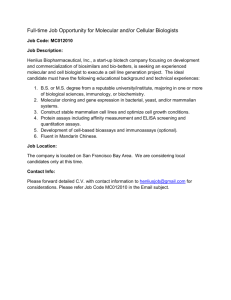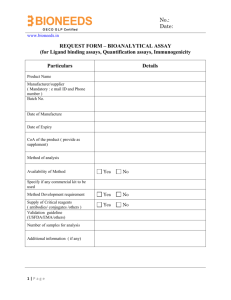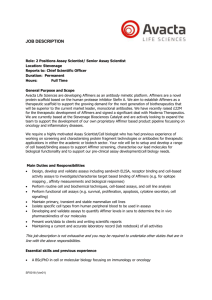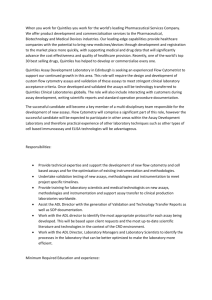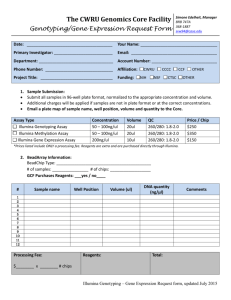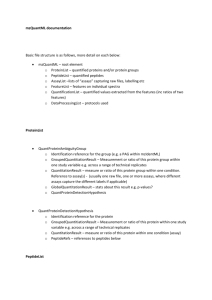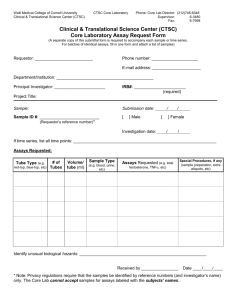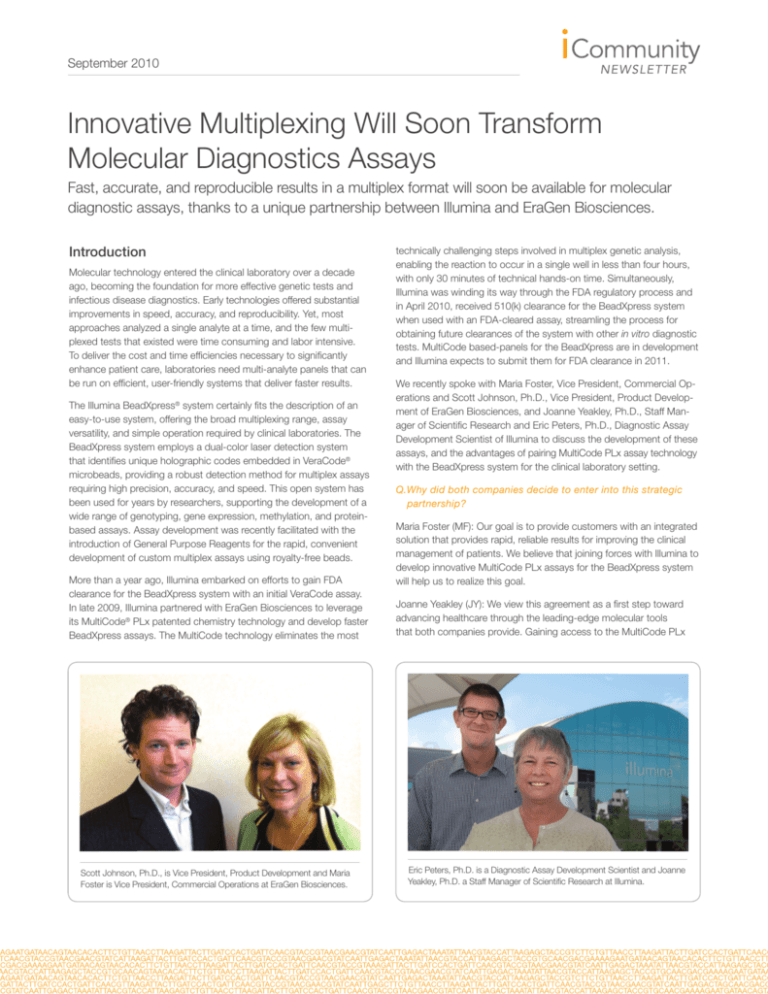
September 2010
Innovative Multiplexing Will Soon Transform
Molecular Diagnostics Assays
Fast, accurate, and reproducible results in a multiplex format will soon be available for molecular
diagnostic assays, thanks to a unique partnership between Illumina and EraGen Biosciences.
Introduction
Molecular technology entered the clinical laboratory over a decade
ago, becoming the foundation for more effective genetic tests and
infectious disease diagnostics. Early technologies offered substantial
improvements in speed, accuracy, and reproducibility. Yet, most
approaches analyzed a single analyte at a time, and the few multiplexed tests that existed were time consuming and labor intensive.
To deliver the cost and time efficiencies necessary to significantly
enhance patient care, laboratories need multi-analyte panels that can
be run on efficient, user-friendly systems that deliver faster results.
The Illumina BeadXpress system certainly fits the description of an
easy-to-use system, offering the broad multiplexing range, assay
versatility, and simple operation required by clinical laboratories. The
BeadXpress system employs a dual-color laser detection system
that identifies unique holographic codes embedded in VeraCode®
microbeads, providing a robust detection method for multiplex assays
requiring high precision, accuracy, and speed. This open system has
been used for years by researchers, supporting the development of a
wide range of genotyping, gene expression, methylation, and proteinbased assays. Assay development was recently facilitated with the
introduction of General Purpose Reagents for the rapid, convenient
development of custom multiplex assays using royalty-free beads.
®
More than a year ago, Illumina embarked on efforts to gain FDA
clearance for the BeadXpress system with an initial VeraCode assay.
In late 2009, Illumina partnered with EraGen Biosciences to leverage
its MultiCode® PLx patented chemistry technology and develop faster
BeadXpress assays. The MultiCode technology eliminates the most
Scott Johnson, Ph.D., is Vice President, Product Development and Maria
Foster is Vice President, Commercial Operations at EraGen Biosciences.
technically challenging steps involved in multiplex genetic analysis,
enabling the reaction to occur in a single well in less than four hours,
with only 30 minutes of technical hands-on time. Simultaneously,
Illumina was winding its way through the FDA regulatory process and
in April 2010, received 510(k) clearance for the BeadXpress system
when used with an FDA-cleared assay, streamling the process for
obtaining future clearances of the system with other in vitro diagnostic
tests. MultiCode based-panels for the BeadXpress are in development
and Illumina expects to submit them for FDA clearance in 2011.
We recently spoke with Maria Foster, Vice President, Commercial Operations and Scott Johnson, Ph.D., Vice President, Product Development of EraGen Biosciences, and Joanne Yeakley, Ph.D., Staff Manager of Scientific Research and Eric Peters, Ph.D., Diagnostic Assay
Development Scientist of Illumina to discuss the development of these
assays, and the advantages of pairing MultiCode PLx assay technology
with the BeadXpress system for the clinical laboratory setting.
Q.Why did both companies decide to enter into this strategic
partnership?
Maria Foster (MF): Our goal is to provide customers with an integrated
solution that provides rapid, reliable results for improving the clinical
management of patients. We believe that joining forces with Illumina to
develop innovative MultiCode PLx assays for the BeadXpress system
will help us to realize this goal.
Joanne Yeakley (JY): We view this agreement as a first step toward
advancing healthcare through the leading-edge molecular tools
that both companies provide. Gaining access to the MultiCode PLx
Eric Peters, Ph.D. is a Diagnostic Assay Development Scientist and Joanne
Yeakley, Ph.D. a Staff Manager of Scientific Research at Illumina.
September 2010
technology for research and clinical markets gives us the advantage
and versatility of embedding this technology into new products.
Q.What is unique about the EraGen MultiCode PLx technology
and how does it enhance molecular diagnostic assays?
Scott Johnson (SJ): MultiCode PLx enables a much higher level of
multiplexing than currently exists for molecular diagnostic assays.
Generally, molecular diagnostics have been available in singleanalyte or dual-plex assay formats. With our technology, we can
put multiple assays together to achieve operations efficiency, as
compared to assays that generate one result for one analyte. There
are four nucleotide bases that make up DNA: adenine (A), guanine
(G), cytosine (C) and thymine (T). Our MultiCode technology uses
an additional two synthetic nucleic acids – iG and iC – to improve
molecular recognition and the ability of the assay to sort out complex
reactions.
MF: These synthetic base pairs allow us to combine analytes into a
single reaction and also offer faster assay processing with shorter
hybridization times, fewer washes, and reduced technologist time.
We are hoping to bring the panel size and complexity found in the
clinical chemistry lab to molecular diagnostics testing. We believe our
MultiCode technology is a huge step forward in bringing multiplexed
molecular diagnostic assays to the clinical laboratory.
Q.What are the advantages of using MultiCode technology on
the BeadXpress system?
MF: EraGen has made its name in creating assays that reduce
laboratory costs and improve assay processing. By partnering with
Illumina, customers will be able to run our assays on a sophisticated
platform that has clear advantages in workflow.
Eric Peters (EP): Multiplexing is a critical advantage and certainly the
wave of the future in molecular diagnostics. It provides more than just
savings in technologist time and labor costs. It also reduces reagent
costs because you are assaying multiple analytes in one well, rather
than performing multiple single-analyte assays one by one. With
96 wells, a laboratory can batch large numbers of samples, without a
corresponding increase in technologist time.
JY: Thanks to the MultiCode Chemistry, we will be able to develop more
complex assays for the BeadXpress system. Because MultiCode can
be used to introduce a label at defined locations within an amplification
product, more sophisticated primer designs can be devised to address
analytes that are difficult to multiplex using standard approaches. The
BeadXpress system offers simultaneous detection of one to several
hundred analytes, enabling us to create panels of even more complex
assays without impacting run time. It also supports single-color, as
well as two-color detection assays to support further multiplexing
flexibility to resolve complex analytical situations.
MF: As the molecular diagnostic industry matures, it becomes more
important to reduce turnaround time and deliver a reliable result.
Clinical laboratories know they are going to have their systems for five
years or more and need reliable technical support to keep them up
and running. Illumina has a great organization, with phone, email, and
field support to provide this level of service.
Q.What benefits do the MultiCode technology and BeadXpress
system bring to the clinical laboratory, and ultimately to
patients?
MF: Our technology will significantly reduce turnaround time for patient
results, putting information into clinicians’ hands so they can quickly
diagnose illnesses. This is especially important for infectious disease
when time is of the essence in controlling an epidemic. But it is no less
important for genetic testing, where patients experience a lot of anxiety
waiting for results.
JY: Trimming a seven-hour-process to a couple of hours is huge
in both cases. With the BeadXpress system, these tests could be
performed on a prioritized basis, with results for the first samples
loaded into the 96-well plate, generated while the rest of the plate is
still processing.
“EraGen has made its name in
creating assays that reduce
laboratory costs and improve
assay processing. By partnering
with Illumina, customers will
be able to run our assays on a
sophisticated platform that has
clear advantages in workflow.”
EP: From a throughput standpoint, the BeadXpress system is ideal for
small and high-throughput laboratories, enabling two-color, ten-plex
assays to be scanned at a rate of 120 samples per hour and 96-plex
assays at a rate of 80 samples per hour. This throughput level is
achieved with the same amount of technologist time that it presently
takes to generate the results of one single-analyte assay.
SJ: Given the staffing constraints of clinical laboratories, reducing
technologist time is critical for any new assay. MultiCode-based
molecular diagnostic assays on the BeadXpress system will help
laboratories control costs in two ways: first, we are performing multiple
assays on multiple samples simultaneously; second, the process to
run a 96-well plate requires less than 30 minutes of total hands-on
time, and the results are reported in less than four hours. That is
a potent combination to significantly reduce technologist time and
laboratory costs, while delivering more clinically relevant information.
MF: Ultimately, we will be helping to drive down medical costs,
by reducing the laboratory costs of providing the answer, and by
expediting diagnosis and treatment to shorten patient stays.
Q.What features of the MultiCode technology and the
BeadXpress system enhance the accuracy, clinical sensitivity,
and clinical specificity of testing results?
SJ: Because our protocol is so dramatically simplified, it reduces the
likelihood of technologist errors, delivering highly reproducible and
September 2010
more accurate results. During the analysis process, the incorporation of
the iG and iC synthetic base pairs into the PCR primers, allele-specific
primers, and proprietary sequence tags attached to the VeraCode
beads, all serve to increase the assay’s specificity. In particular, the
VeraCode beads enable us to achieve a very high level of specificity
with relatively short sequences.
JY: The BeadXpress system delivers high-quality data, with industry
leading measurement density and sensitivity through stringent code
detection on the VeraCode beads. In the clinical studies Illumina performed
to obtain its April 2010 FDA 510(k) clearance, the VeraCode assays
on the BeadXpress system demonstrated sample accuracy of 100%.
Having navigated the regulatory path once before, we are poised to
develop more high value content for follow-on FDA submissions.
“Clincial laboratories know they are
going to have their systems for five
years or more and need reliable
technical support to keep them up
and running. Illumina has a great
organization, with phone, email,
and field support to provide this
level of service.”
EP: VeraCode technology significantly enhances analyte specificity.
The unique holographic code embedded in each VeraCode bead
type can be used to quickly identify one bead type from another. In
any given assay, there is an average of 30 replicates per bead type,
providing high redundancy to deliver high-quality data. In addition to
the replicates of each bead type, each bead is imaged for analyte
detection 12 times with both the read and green laser. This redundancy contributes to the high reproducibility the BeadXpress system
is able to achieve, generating over 300 independent data points for
each analyte.
Q.In addition to generating high quality data, what else makes
the BeadXpress system well suited for the clinical laboratory?
JY: VeraCode beads are highly stable and can be stored as kitted
plates. Their digital coding enables traceability of target(s) of interest, as
well as critical identifiers, such as the beads associated with specific
reagent kits.
EP: As the BeadXpress instrument scans a 96-well plate, it acquires
fluorescence data and associated code data for each VeraCode
microbead, compiles a virtual representation of the plate, and exports
the data for downstream analysis with Illumina’s VeraScan software.
This user-friendly software is ideal for clinical laboratories, providing
administrator control for setting user-specific accounts and rights,
configuring default file locations, and defining security options, including
email alerts.
Q.Are there plans for Illumina to transition existing assays to
MultiCode-based assays on the BeadXpress system?
JY: We see tremendous value in using the EraGen Chemistry to
enhance the assays we have been developing for the BeadXpress
system. By cutting the assay time for future diagnostic assays using
MultiCode, we will enable laboratories to perform testing much faster
and more easily. Our life science business unit is also thinking creatively about how to incorporate the EraGen technology as well.
Q.Illumina also offers VeraCode technology with General Purpose Reagents for the rapid development of custom multiplex
assays. What is the value of an open system in the clinical
laboratory and for potential partners?
SJ: Clinical laboratories welcome open systems, because they can
develop and perform a variety of molecular diagnostic tests that leverage
different assay technologies, on the same system. With bench top
space at a premium, the more assays a system can run, the more
valuable it is in a clinical laboratory setting.
JY: VeraCode technology provides a lot of flexibility, making it easy
to port an existing assay over onto the platform. Illumina is focused
on building content with GMP reagents and royalty-free GPR beads
facilitating assay development.
In addition, Illumina is recognized as the gold standard in genotyping,
thanks to systems like the BeadXpress instrument. We have reduced
the development hurdle for our assay partners, enabling them to test
and generate data for their own FDA submissions on a BeadXpress
system that has made it through the 510(k) clearance process.
“We have reduced the development
hurdle for our assay partners,
enabling them to test and
generate data for their own FDA
submissions on a BeadXpress
system that has made it through
the 510(k) clearance process.”
MF: EraGen is working very hard to complete development of
MultiCode assays, to obtain FDA clearance, and to expand the assay
menu available for the BeadXpress system.
Q.Is EraGen open to establishing partnerships with other entities
to develop assays for new clinically validated markers?
MF: Yes, we are seeking partnerships with research institutes and
companies to develop MultiCode assays as new markers are identified
and validated. The panels will naturally evolve over time, expanding
and differentiating to meet the needs of the clinical laboratory. The
economics of running these panels on the BeadXpress system will
help to support this evolution.
September 2010
Q.What will be the first MultiCode assays available on the
BeadXpress system?
MF: EraGen technology is well-suited for infectious disease and
genetics testing. We have several research use only (RUO) multiplex
assays in each category that have been quite successful. I believe
those types of assays, once FDA-cleared, will be the first you will see
on the BeadXpress system.
Q.What does the future hold for molecular diagnostic testing?
SJ: It is all about the opportunity to take a really broad menu of singleanalyte esoteric assays and combine them into panels. Because of its
open nature, the BeadXpress system can be the system to unite all
these assays into panels that make sense for a clinical laboratory.
EP: In general, multiplexing will allow the testing of common and rare
infectious organisms on a more routine basis. In the future, I think we
will see pharmacogenetic assays that will help physicians determine
which drug will work best for a particular patient. The speed of a
MultiCode assay on the BeadXpress system will provide the quick
turnaround needed for such tests.
JY: In the clinical laboratory, it is increasingly becoming a race for
which system is faster, has the lowest hands-on time, and the
simplest workflow. Having a faster chemistry, such as the MultiCode
assay, will enable the BeadXpress system to better fulfill the needs of
the clinical laboratory.
References
1.www.illumina.com/documents/products/datasheets/datasheet_beadxpress_reader.pdf
2.www.illumina.com/technology/veracode_technology.ilmn
3.www.eragen.com/Technology
Illumina, Inc. • 9885 Towne Centre Drive, San Diego, CA 92121 USA • 1.800.809.4566 toll-free • 1.858.202.4566 tel • techsupport@illumina.com • illumina.com
FOR RESEARCH USE ONLY
© 2010 Illumina, Inc. All rights reserved.
Illumina, illuminaDx, Solexa, Making Sense Out of Life, Oligator, Sentrix, GoldenGate, GoldenGate Indexing, DASL, BeadArray, Array of Arrays,
Infinium, BeadXpress, VeraCode, IntelliHyb, iSelect, CSPro, GenomeStudio, Genetic Energy, HiSeq, HiScan, TruSeq, and Eco are registered
trademarks or trademarks of Illumina, Inc. All other brands and names contained herein are the property of their respective owners.
Pub. No. 070-2010-019 Current as of 27 September 2010

